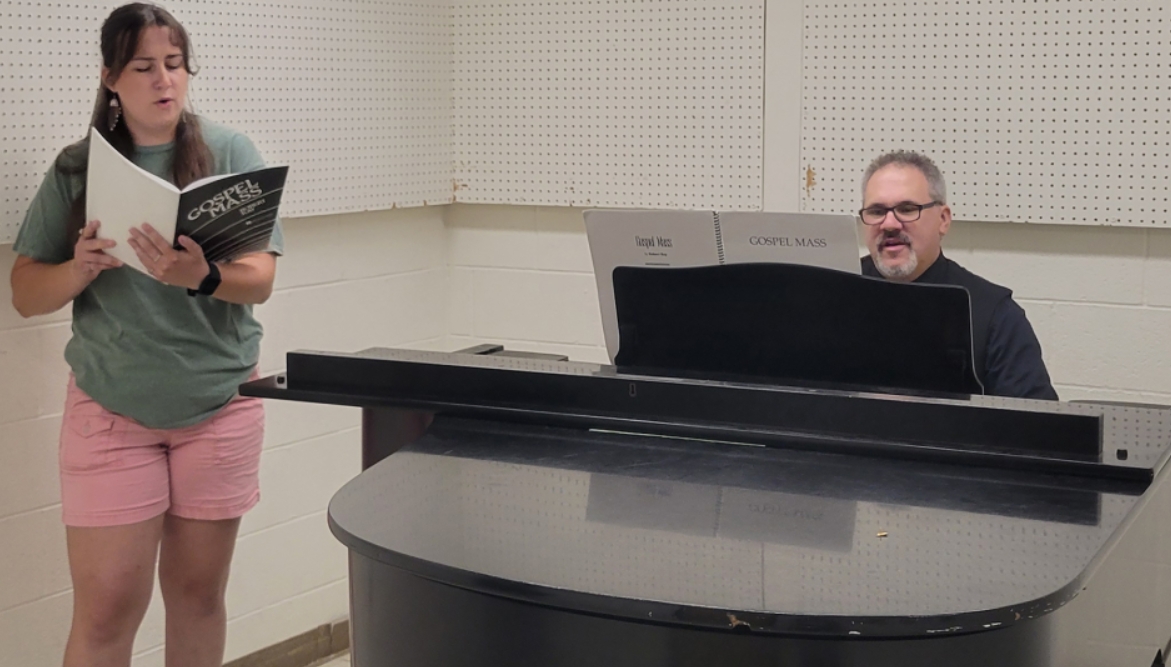By Jalyn Bolyard, Online Editor
On Oct. 1, West Liberty science students shined at the 69th National Conference of Chi Beta Phi at Davis and Elkins College in Elkins, W.Va. The WLU chapter was awarded the Most Outstanding Chapter and two student presenters, Katelyn “Katie” Yauch and Taylor Rogerson, earned second and third place, respectively, for their research.
“I enjoyed learning about research that students across the nation were working on,” Rogerson said. “The conference was an excellent opportunity for me to talk about the research I have been conducting as well.”
Yauch is a senior pre-med student. Her plan after graduation is going to medical school. The title of her presentation was “Ecology of Ammonium Oxidizing and Nitrite Oxidizing microorganisms in Nambian Costal Upwelling Zone.” She did this research project under Dr. Evan Lau, who is now a professor at Menlo University in California.
“The main thing we were doing before he left,” Yauch said, “was trying to find what species of ammonium oxidizing archaea and bacteria and nitrite oxidizing bacteria were present at different depths of seawater upwelling off the coast of Namibia. We were in collaboration with Dr. Caitlin Frame, who took the samples for us.”
After DNA was extracted from the samples, they amplified the 16 ribosomal ribonucleic acid (rRNA) gene using polymerase chain reactions (PCR). Then, Yauch and her team used that to identify the species of microorganisms that lived in the zone.
“It was a really cool project that I had been working on for a year along with the rest of our research team,” Yauch said.
Rogerson is a senior human biology student. After graduation, she plans to further her education and earn a master’s degree in physician assistant studies. The title of her presentation was “Intra-erythrocytic Francisella tularensis are protected from acidic pH – implications on enhancing colonization of ticks.” Rogerson started her research in the summer of 2014. She did her research under WLU associate professor of biology Dr. Joseph Horzempa.
Francisella tularensis is a highly infectious bacterium that causes the tularemia disease, more popularly known as rabbit fever or deer fly fever. Humans can acquire tularemia through inhalation, oropharyngeal exposure or tick bites.
“F. tularensis has the ability to invade erythrocytes,” Rogerson explained. “The research I have been working on suggests that F. tularensis is protected by erythrocytes from an acidic environment, such as the tick gut.”
Yauch and Rogerson also are WLU’s Chi Beta Phi’s secretary and treasurer, respectively.
“Chi Beta Phi is a fun club,” Yauch said. “We do a lot of fundraising activities.”
“I have enjoyed my time as a member of Chi Beta Phi,” Rogerson said. “My favorite annual event is the Chi Beta Phi chili cook-off.”
Chi Beta Phi is an interdisciplinary scientific honorary for undergraduate students. WLU is a part of the Rho Chapter. The goal is to encourage interests in science and to also give recognition to scholarly achievements. It is an affiliate society of The American Association for the Advancement of Science (AAAS) since 1935. It is not restricted to any particular discipline of scientific field and instead looks at all areas of science.
Five students presented their research while seven students also attended the national conference, including Austin Cusick, senior pre-med student and WL’s chapter president. Assistant professor of chemistry, Dr. Theunis van Aardt (Dr. T) is also the faculty advisor for the honorary.
For more information about the College of Sciences and what they are up to, check out their website.
Photo credit: Taylor Rogerson







